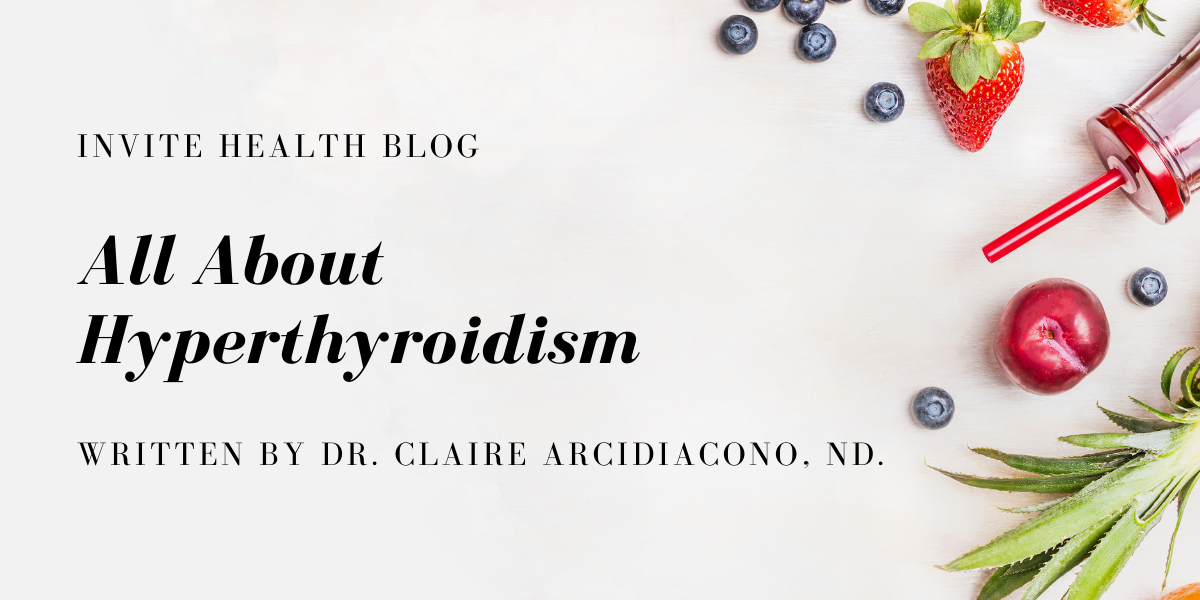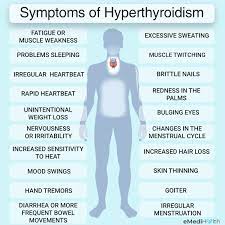All About Hyperthyroidism

Hyperthyroidism
Written by Dr. Claire Arcidiacono, ND
For further questions or concerns email me at carcidiacono@invitehealth.com
The thyroid can experience multiple dysfunctions. Here’s what you need to know about hyperthyroidism.
What is Hyperthyroidism?
Hyperthyroidism is where you produce too much thyroid hormone. Your TSH will be lower than optimum and your T3/T4 will be higher than normal. For more information feel free to see the blog about thyroid tests! Hyperthyroidism can sometimes present as something called a thyroid storm. This is very dangerous and is beyond the scope of this article. A thyroid storm must be treated conventionally. Once the storm calms and things settle depending on what is going on with the thyroid complementary medicine can be combined with conventional treatments.† (1)
ALL ABOUT THYROID TESTS. >> Read Now!
The symptoms of hyperthyroidism are sometimes quite similar to those of hypothyroidism. However in most cases these symptoms are the exact opposite! For example in both hyperthyroidism and hypothyroidism people experience hair loss, changes in menstrual cycles as well as fatigue. Many with hyperthyroidism will experience a rapid heartbeat as well as a nervous/anxious feeling. Unlike in hypothyroidism where weight gain is common in hyperthyroidism there is an increased appetite but this increase in appetite is accompanied by weight loss. Instead of constipation there is diarrhea. Instead of being cold there is an intolerance to heat, Swelling of the eyes as well as swelling/ enlargement of the neck due to the enlargement of the thyroid is also very common.(2) Just like last week I will include a picture of all the many symptoms of hyperthyroidism since it affects almost every system!† (3)

What can lead to the symptoms of hyperthyroidism?
First consuming too much iodine can put you at risk of producing too much thyroid hormone (which is why taking iodine in high doses can be dangerous). Inflammatory and autoimmune problems can affect the thyroid as well. I will be discussing this more next week but I did want to mention it here since it so often causes hyperthyroidism. For example thyroiditis is inflammation of the thyroid. It is interesting because it can initially cause symptoms of hyperthyroidism but overtime the thyroid gets “tired” and this leads to less hormone being produced leading to a switch to hypothyroidism! Interesting stuff! Graves’ disease is an autoimmune that causes 85% of all hyperthyroidism cases!†
Thyroid nodules are basically a growth of extra thyroid cells. These may or may not be able to produce hormones. If they do produce hormones there will be extra hormones leading to hyperthyroidism. If the cells are inactive they do not lead to hyperthyroidism.† (4)
How to Help Your Thyroid
There are herbs and supplements found to be very helpful either in studies or in traditional uses passed down through generation to generation. As I mentioned previously in this article a thyroid storm is dangerous and must be treated conventionally until it has passed the dangerous phase. Working with hyperthyroidism is in a way more difficult than hypothyroidism because the increase in hormones can be very dangerous. I advise working with a qualified nutritionist from InViteⓇ Health.†
- Bugleweed in studies seems to inhibit thyroid hormone secretion. This leads to a reduction in symptoms. It also appears to stop the conversion of T4 into T3 leading to a less active hormone!†(5)
See Select InViteⓇ Health stores for this product! Please note this product may have to be special ordered.†
- Motherwort has been used traditionally to help with the symptoms of hyperthyroidism but especially for the symptoms of anxiety and rapid heart rate.† (6)
See Select InviteⓇ Health stores for this product! Please note this product may have to be special ordered.†
- Lemon balm in studies appears to inhibit the conversion of T4 to T3 thus lowering active hormone in the body and therefore reducing symptoms. (7) While this herb may also specifically help Graves’ disease I’ll be discussing that more specifically next week!† (8)
See InviteⓇ Health Tranquil Tx™ for this wonderful herb!†
- L – Carnitine (and its friend Alcar!) These have been found in studies to inhibit the production of both T4 and T3! This leads to an overall reduction in hormones! Leading to fewer symptoms.†(9)
See InviteⓇ Health L-Carnitine 500mg, L-Carnitine liquid, Alcar with ALA, or our cerebral care (there’s nothing wrong with getting memory and thyroid support at the same time).†
- CoQ10 has an interesting relationship to thyroid health. Studies show that in cases of hyperthyroidism there is very low plasma CoQ10. This is opposed to hypothyroidism which seems to have very high levels of plasma CoQ10. In the case of hyperthyroidism CoQ10 in studies appears to lower the conversion of T4 to T3. Thus reducing active hormone therefore reducing symptoms.(10)
See InviteⓇ Health CoQ10 (Ubiquinol) 60mg, CoQ10 (Ubiquinol) + Coenzyme 1 (NADH), and Coenzyme Q10 Chewable. As well as our Energy HxⓇ and Dr. Pressman’s Ribose complex!†
Next week we will get into more detail regarding autoimmune and Graves but I wanted to mention that anything that helps inflammation in the body will be helpful. For example Curcumin has been found to in studies to reduce inflammation.†(11) See InviteⓇ Health Bio-curcumin 5-Loxin, Dr. Pressman’s Curcumin blend, Turmeric with ginger and Dr. Pressman’s Osteo-Lube.†
Next week we will be talking about autoimmune issues and inflammation of the thyroid!†
⦁ https://www.uclahealth.org/endocrine-center/normal-thyroid-hormone-levels
⦁ https://my.clevelandclinic.org/health/diseases/14129-hyperthyroidism
⦁ https://www.emedihealth.com/glands-hormones/thyroid/treat-hyperthyroidism
⦁ Merck Manual Consumer Version. Hyperthyroidism. (https://www.merckmanuals.com/home/hormonal-and-metabolic-disorders/thyroid-gland-disorders/hyperthyroidism) Accessed 11/3/2021.
⦁ Beer, A. M., Wiebelitz, K. R., & Schmidt-Gayk, H. (2008). Lycopus europaeus (Gypsywort): effects on the thyroidal parameters and symptoms associated with thyroid function. Phytomedicine : international journal of phytotherapy and phytopharmacology, 15(1-2), 16–22.
⦁ Blumenthal M, Goldberg A, Brinckmann J, eds. Herbal Medicine: Expanded Commission E Monographs. Austin, TX: American Botanical Council; Newton, MA: Integrative Medicine Communications; 2000.
⦁ Aufmkolk M, Kohrle J, Gumbinger H, et al. Antihormonal effects of plant extracts: iodothyronine deiodinase of rat liver is inhibited by extracts and secondary metabolites of plants. Horm Metab Res. 1984;16(4):188-192.
⦁ Aufmkolk M, Ingbar JC, Kubota K, et al. Extracts and auto-oxidized constituents of certain plants inhibit the receptor binding and the biological activity of Graves’ immunoglobulins. Endocrinology. 1985;116(5):1687-1693.
⦁ https://pubmed.ncbi.nlm.nih.gov/15591013/
https://www.researchgate.net/publication/6912448_Relationships_between_plasma_CoQ10_levels_and_thyroid_hormones_in_chronic_obstructive_pulmonary_d⦁ isease
⦁ https://www.ncbi.nlm.nih.gov/pmc/articles/PMC5664031/

